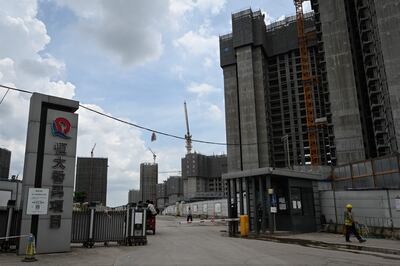The clock is ticking for the world’s most indebted developer, whose liquidity woes sparked a broader debt crisis in China’s property market that has engulfed more home builders and posed growing challenges for the government.
China Evergrande Group, once the country’s largest real estate company, had earlier said that it was on track to deliver a preliminary restructuring plan by the end of July. That leaves mere days for the builder with about $300 billion of liabilities, just as a shake-up stirs fresh uncertainties.
The group said on Friday that chief executive Xia Haijun was forced to resign amid a company probe into how 13.4bn yuan ($2bn) of deposits were used as security for third parties to obtain bank loans, which some borrowers then failed to pay back. Chief financial officer Pan Darong was also made to step down.
Siu Shawn, an Evergrande executive director, is taking over the company as chief executive. Mr Siu said that the company has reached “basic consensus” on debt-restructuring principles with multiple major global creditors, according to a Friday report by 21st Century Business Herald.
The company rocked markets late last year when it defaulted on dollar-bond payments after liquidity scares that began in 2020. Contagion from that shock has dragged Chinese offshore junk (non-investment grade) notes, most of which come from property companies, deeper into distress.
Meanwhile, Evergrande’s creditors have been left with little indication of how much they may recover, in what would be one of the nation’s largest-ever debt restructurings.
As important as any clarity on that would be, though, there is much more at stake. Money managers and policymakers are bound to see the Evergrande restructuring as an important precedent for dealing with ever-expanding defaults and restructurings in China’s real estate market, which accounts for about a quarter of the world’s second-biggest economy.
Evergrande’s restructuring proposal may shed light on the government’s treatment of offshore bondholders, said Jean-Louis Nakamura, chief investment officer for the Asia Pacific region at Lombard Odier. He said the level of authorities’ intervention, such as in the management of the group, “will also be informative about how policymakers consider handling the property crisis going forward”.
Critical elements to watch out for would be the company’s asset disposal plans as well as terms on potential haircuts or maturity extensions, Mr Nakamura said.
As risks build, the government has been ramping up support for the sector, only months away from a once-in-five-years Communist Party meeting where President Xi Jinping is expected to seek a third term.
Financial information provider REDD reported that China’s State Council has approved a plan to set up a fund to support developers, boosting the sector’s stocks and bonds on Monday.
“Evergrande’s change of chief executive and chief financial officer may not affect its announcement of a preliminary debt plan by the end of this month,” according to a report by Bloomberg analysts including Daniel Fan.
Among potential motivating factors for meeting its previous timeline is that Evergrande has an electric vehicle unit that began taking pre-orders earlier this month for an electric sports utility vehicle. The group would want to avoid any takeover of that unit as well as potentially being sued by creditors, they wrote.
What began as a downturn in China’s housing market sparked by a government crackdown on developers’ excessive borrowing and real estate speculation in 2020, has snowballed in recent weeks into unprecedented loan boycotts from angry homebuyers and suppliers.

Liquidity crunches have prompted developers to stall many projects across the country and leave fees unpaid. In one example of how this is all cascading, a group of small businesses and suppliers that said they would stop paying their own debts, blamed Evergrande for leaving them out of pocket.
As angst in China’s real estate and credit markets spreads, Evergrande’s next steps will be scrutinised all the more. The builder urged patience and asked investors not to take aggressive action during a call in March. But unresolved issues have only grown since.
Adding to challenges posed by unfinished housing projects and delayed financial results, the company also recently suffered its first rejection from local creditors to extend a bond payment, a development that may result in a landmark onshore default.
Evergrande did not offer comment on this.
The property company’s debt plan will inevitably be seen as a potential road map for other developers. Most of the real estate firms that have defaulted on dollar bonds amid the government’s campaign to tame runaway debt loads have yet to present restructuring plans, with many opting instead to delay maturities.
Another focus is how authorities will balance any state intervention with long-standing efforts to wean the nation’s credit markets from assumptions that borrowers would be bailed out.
The extent of any government involvement is an open question after Evergrande established a seven-member risk management committee last year. This included senior managers from state-owned bad debt manager China Cinda Asset Management and state-owned enterprises in its home province of Guangdong.
At the same time, senior Chinese regulators have repeatedly said in public that debt risks at Evergrande and other distressed property companies should be dealt with in a “market-oriented way".

